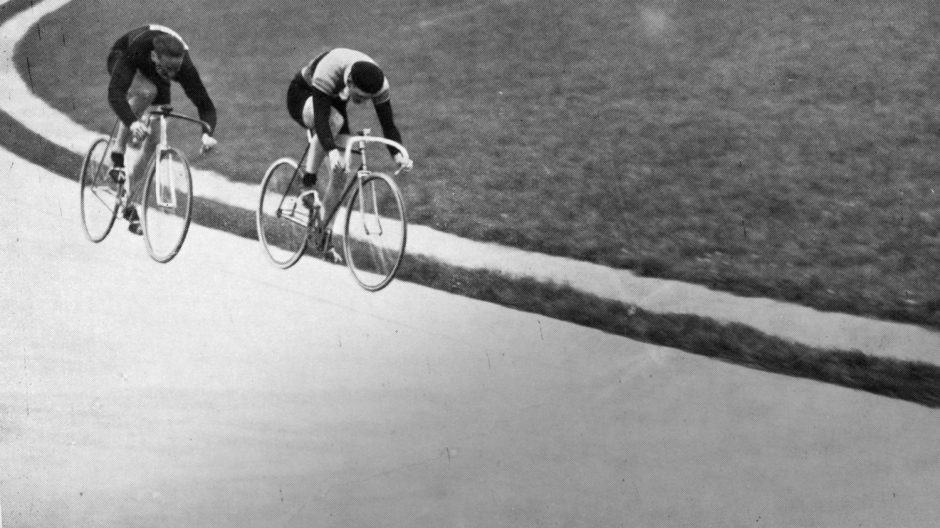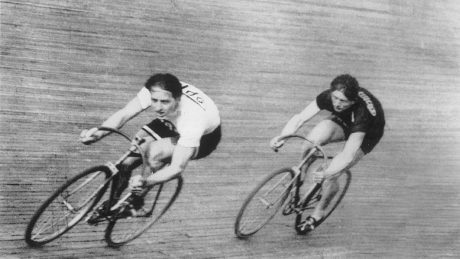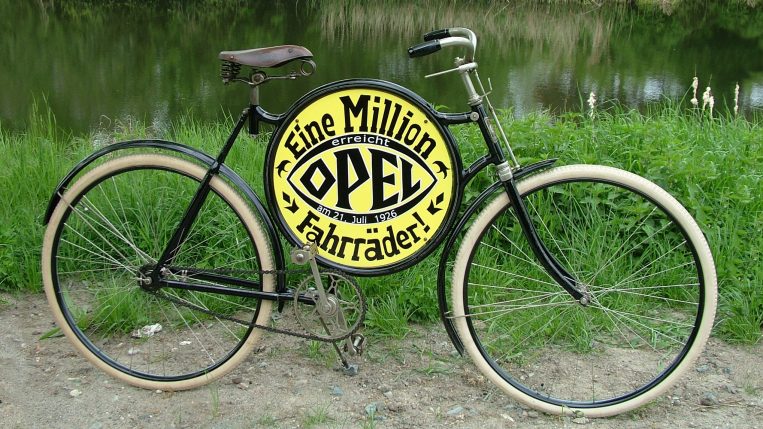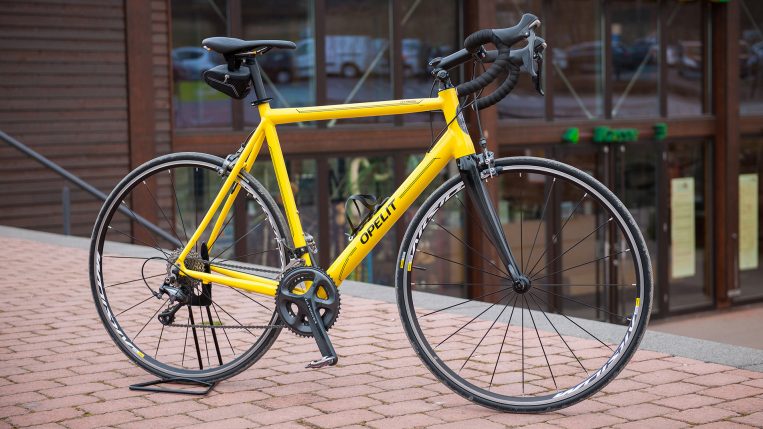As is always the case in discussions of competitive sports, it doesn’t take long for the topic of ‘modern commercialization’ to come up. This trend is discussed for all types of sports, and the growing importance of profits and advertising income in the sports world is widely considered a modern phenomenon. “In fact, though, this kind of blanket criticism of the commercialization of sports, particularly bicycle racing, rests on an incorrect perception of historical circumstances,” says Nicolas Lange.
Opel was a sports
marketing pioneer
Lange, a Rüsselsheim native, earned his master’s in history with a focus on technical history from Technische Universität Darmstadt last year and dedicated his master’s thesis to the history of bicycle production at Opel.
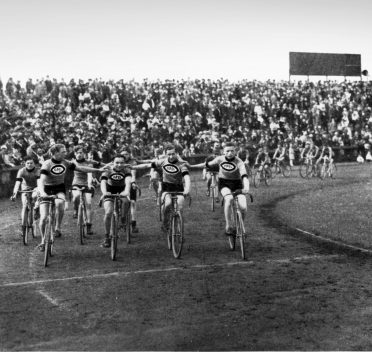
Cyclists from the Nuremberg cycling club riding in front of thousands of spectators (1927).
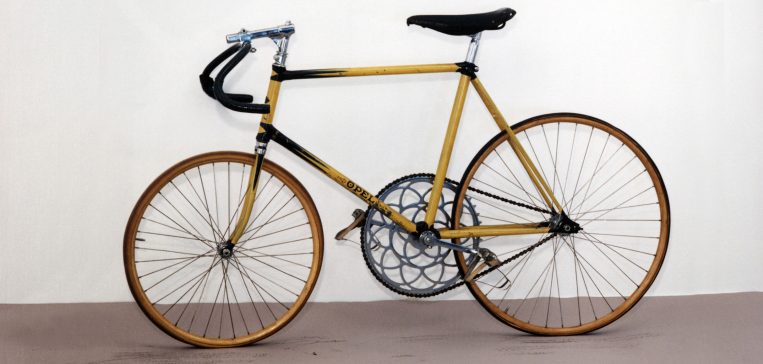
On 29 September 1928, the Belgian cyclist Léon Vanderstuyft set a new world record in the slipstream of his pacer, Lehmann, at the Montlhéry car racetrack near Paris: He covered 122.771 km in one hour inside a modified Opel ZR III racer with 193 gear inches.

This bicycle racing newspaper ad (circa 1900) references races won on Opel bikes.
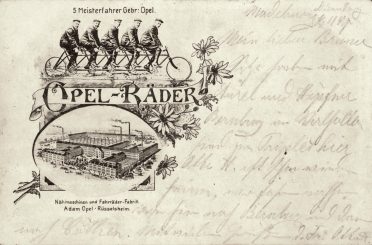
Postcard featuring five champion cyclists.
Lange asserts that “When it comes to soccer, it’s widely known that the sport didn’t start with 11 friends just kicking around a ball together. It’s similar for bicycle racing: Although it began as a ‘gentleman’s sport,’ bicycle manufacturers’ vested economic interests quickly led to the sport’s professionalization.” In his master’s thesis, Lange vividly demonstrated how Opel used bike racing for advertising purposes from the very beginning, and also further developed the sport in doing so. According to Lange, “Numerous historical documents attest that the bicycle races won on Opel models were very important to the company’s advertising.”
Opel wasn’t alone in this, either: The most famous bike race in the world, the Tour de France, was founded in 1903 by Henri Desgrange (the publisher of L’Auto, a French sports paper) as an advertising tactic. The jersey worn by the overall leader of the race at any given point is yellow because L’Auto used to be printed on yellow paper. Moreover, the retinue of cars emblazoned with ads driving around the Tour isn’t a new concept; it’s part of a longtime and ongoing tradition.
Ads promise: ‘Ride an Opel
to become a champion’
“There was no television at that time. Popular events such as tours or six-day races were therefore ideally suited for advertising,” reports Lange. Today, manufacturers are seldom discussed in the context of bicycle racing; general public interest has turned to the cyclists instead. Things were different at the end of the 19th century, when the spotlight was on brands. To wit: Opel’s advertising slogan was ‘Ride an Opel to become a champion’.
Opel History: From Two Wheels to Four
Back when Rüsselsheim was the epicenter of global bicycle production and modern bike racing
- The bicycle would definitely have made its way to Germany at some point, no matter what. But the arrival came early, thanks to Adam Opel, who had previously only produced sewing machines. Opel saw the first penny farthings in Paris in 1885. He ordered the individual parts to make them and sold the first penny farthing built in Rüsselsheim in the following year. The first image above shows one of the first bicycles made by Opel. Due to its high weight and the low rolling circumference of its pedal-driven front wheel, this vehicle wasn’t able to reach high speeds. The company started producing models with front wheels to change this. These also raised the position of the seat, which in turn increased the risk of injury to the cyclist. As a result, penny farthings gained a bit of a reputation for being unsafe.
- This image shows an Opel-Niederrad Blitz, one of the first Opel ‘Safeties,’ equipped with a Swift frame and a duck brake. Originally produced alongside penny farthings, these types of models quickly came to replace them. Adam Opel also helped found the RV Opel Rüsselsheim cycling club in 1888. The club still exists to this day.
- Adam Opel’s son Karl took part in his first bike race on an Opel bike as an experiment, competing in Frankfurt’s Palmengarten botanical garden. When he came in first place, five orders quickly arrived from customers, demonstrating that victories are the most effective kind of advertising. In 1889 alone, 240 racing victories were won on Opel bikes. The company hired professional cyclists, and also attained success through its own scions: In the following years, the Opel sons (known as the ‘Rüsselsheim Five’) won over 560 bike races. Pictured on the Quintuplet: Ludwig, Fritz, Heinrich, Wilhelm, and Carl Opel (right to left).
- Opel became the first German company to introduce assembly lines in bicycle manufacturing in 1923, and became the world’s largest bicycle manufacturer in 1925. In 1926, the millionth Opel bicycle was produced.
- In 1931, Opel held the ‘Große Opel Deutschland Rundfahrt’ (Grand Opel Germany Tour), which started and ended in Rüsselsheim. This was the first race of its kind in Germany. This event was special in that all of the cyclists rode on Opel ZR-III racers (pictured here: a special 1929 promotional ZR3 model with low-pressure tires). However, despite all of the successes Opel achieved in the bicycle business, the tide was turning towards motorization. Opel sold its bicycle business to NSU in 1936.
- The history of Opel bicycles is not yet over, even though more than 80 years have passed since Opel sold off its bicycle production. Gregor von Opel, the great-grandson of company founder Adam Opel, produces a colorful range of bicycles for the ‘Opelit’ brand, from city bikes to racing models made from carbon. The names of the models – ‘Mainhattan,’ ‘Taunus,’ and ‘Feldberg’ – have a regional charm. In a nod to tradition, the names of the city bikes include the term ‘blitz.’ In the modern age of electromobility, it seems clear that the revived Opel biking tradition faces a bright future.
As was the case with many companies, Opel shifted its focus more and more towards automobiles in the late 1920s. Nevertheless, bicycle racing remained a key aspect of brand communication, up until the company’s bicycle business was sold off in 1936.
“Opel always knows to recognize and take advantage of opportunities.”
“It’s a pity that the Opel’s glorious history with bicycles doesn’t get more attention,” Lange sums up. “In its dealing with bikes, the company lived out one of its classic credos: Detecting available opportunities at an early stage and making systematic use of them. That’s always been how Opel acts, and it continues that tradition to this day.”
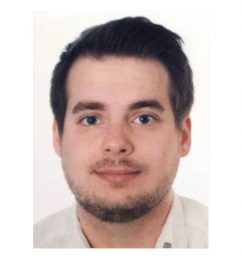
Nicolas Lange wrote his master’s thesis at TU Darmstadt about the historical relationship between bicycle racing and Opel. The title: ‘Fahre Opel, dann wirst Du Meister! – Fahrradrennen unter besonderer Berücksichtigung der Reklamemöglichkeiten, 1886-1937’ (Ride an Opel to Become a Champion! – Bicycle Racing and Advertising Opportunities from 1886 to 1937).

Bicycle production at the Rüsselsheim plant in 1927.
January 2018
